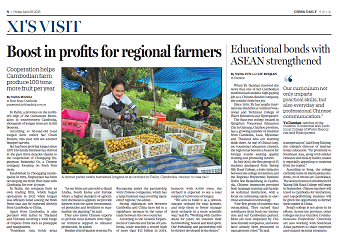Coffee award was a long time brewing
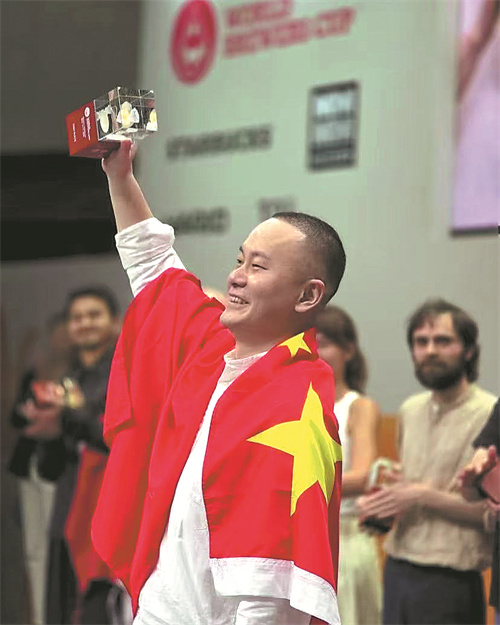
Peng Jinyang wins the 2025 World Brewers Cup and becomes the second barista from the Chinese mainland to claim the title. [Photo provided to China Daily]
World barista title for Chinese winner sees precision, passion and patience foam to the top, Li Yingxue reports.
Under scorching stage lights in the Indonesian capital Jakarta, the air was electric. The host of the 2025 World Brewers Cup stood center stage, announcing the results in reverse order. Among the nine finalists, places three through to nine had already been revealed.
Only two names remained at the final, held last month: Bayu Prawiro of Indonesia and Peng Jinyang of China. One would be called; the other would be crowned world champion.
Cheers erupted — Indonesian fans roaring, Chinese supporters shouting with pride.
Then came the moment.
"Bayu Prawiro," the host called.
The room exploded — not in disappointment, but in jubilation. Peng became the 2025 World Brewers Cup champion and the second barista from the Chinese mainland to claim the title.
It was a triumphant culmination of precision, passion and patience. In a competition where every gram, degree, and second matters, Peng rose above the rest — not just through technical mastery, but by infusing each pour with quiet confidence and storytelling flair.
Peng, better known by his nickname Captain George, is a fan of Marvel Comics' superhero Captain America. With a soft spot for heroism, he just became a superhero in his own world — the world of coffee.
"I was overwhelmed by the deafening cheers at the venue," the 34-year-old recalls. "It was the realization of a dream I've carried for so many years. I was emotional, but what truly moved me was the cheering from the Chinese fans. That meant the most."
That was Peng's second appearance at the World Brewers Cup. His debut, back in 2023, saw him finish fifth — an impressive result, but one that left him hungry for more.
"This year, I gave it everything," he says. "Last time, I cut corners but still hoped for the best. This time, I truly have no regrets."
When not at his cafe or roasting facility, Peng squeezed in practice wherever he could. A month before the competition, he flew to Jakarta with his team — and nearly 500 kilograms of gear. They rented an apartment, re-created the competition setup in their living room, and trained full time.
"We even hired a local carpenter to build a replica of the competition table," Peng recalls.
He thought through every possible detail. The event would be held in a cavernous, open venue filled with thousands of spectators and the constant buzz of coffee exhibitors. All that noise, all that space — it could throw off a brew. So Peng adjusted.
"In a loud environment, coffee that tastes perfectly balanced at home or in a cafe can suddenly come across as bitter," he explains. To prepare, his team created high-noise simulations so he could recalibrate his brews accordingly.
Even the presentation didn't escape his perfectionism. The script he used onstage went through 16 revisions before he finally settled on the one that felt just right.
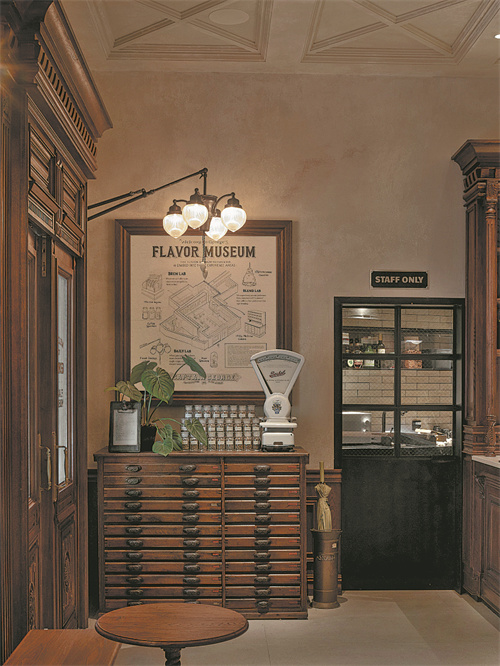
The interior of the cafe. [Photo provided to China Daily]
Captain and crew
Peng's journey has never been a solo act. Among the key members of his team is Li Jinkun, a high school classmate and now his longtime business partner. Since 2013, the two have been building their coffee dream together — opening cafes, diving into roasting, and now running a 100-person roasting facility and four shops across Guiyang, capital of Guizhou province, and Shanghai under the Captain George name.
Seven years ago, they began competing in brewing competitions, taking turns representing their team. Between them, they've already claimed several national titles. "We've always backed each other," Li says. "It's a true team effort."
In the month leading up to the 2025 competition, the team designed a detailed training plan tailored to the World Brewers Cup format. "It's not just about brewing a great cup within the time limit," Li explains. "You also have to articulate the entire process — explain the bean, the flavor profile, your technique. It's multitasking under pressure. Both your hands and your words have to be precise."
Unexpected challenges are common in competition. After every event, Peng's team sits down to review what happened, dissecting each moment to build experience for the next run.
Li recalls Peng's first foray into competition back in 2018 — even before the China contest began, Peng was already preparing beans for the world championship.
"He told us then that he was going to become world champion," Li says. "Back then, maybe only he believed it. But in 2025, he was still there, still focused, still chasing that same goal. And when the result was finally announced — I believed it."
Looking ahead, Peng says he wants to help his team members prepare for future competitions and hopes to mentor the next World Brewers Cup. Personally, he's also considering a new challenge: starting from scratch in coffee roasting competitions.
For him, coffee competitions are more than personal milestones — they drive the entire industry forward. "Preparing for a competition forces you to push your limits," he says. "And the dynamic of friendly competition and collaboration among baristas helps elevate the craft across the board.
"In recent years, tournaments in China have become increasingly competitive. At the same time, our skills are getting closer and closer to global standards."
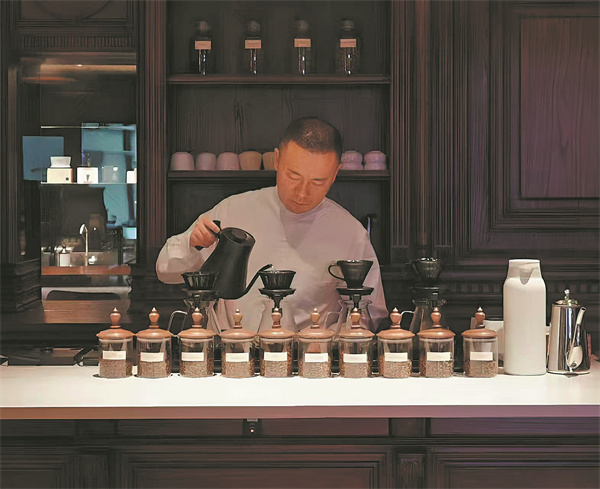
Peng shows his expertise. [Photo provided to China Daily]
Matter of taste
Victory hasn't slowed him for a second. At home, his cafes are frequented by fans.
One user on Xiaohongshu, or RedNote, Li Yizhu, shared that she's been drinking coffee from Peng's cafes since 2015. Even when visiting other cities, she often finds coffee shops using beans roasted by Peng's team. "This shop holds a special place in my heart," she wrote. "I've been drinking their coffee for 10 years."
She also offered tasting notes from Peng's Guiyang locations: "The Wenchang location has higher foot traffic, but the drinks are consistently good — especially signature drinks. The Taiping Road shop is perfect for hand-brews, especially during quieter hours."
In Shanghai, Peng calls his cafe a "flavor museum". It's where he hopes customers will slow down and truly taste the nuances of a cup of coffee. His Guiyang locations, by contrast, are his "daily clubs" — spaces that serve as community hubs for casual gatherings and coffee lovers alike.
He's also planning a second "flavor museum" in Guiyang, with more cities on the horizon.
His win is also emblematic of Guiyang's fast-rising coffee scene. While the city doesn't grow its own beans, its population of over 6 million and more than 3,000 cafes have brought forth one of the most vibrant coffee cultures in China.
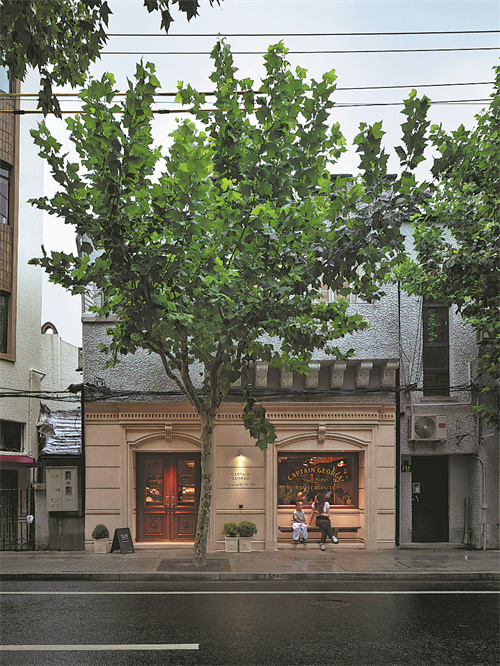
Peng Jinyang's cafe, Captain George Flavor Museum, in Shanghai. [Photo provided to China Daily]
The science of flavor
Temperature was the central theme of Peng's presentation at this year's World Brewers Cup — an idea drawn from years of roasting and brewing.
"In our cafe in Shanghai, we've installed an infrared thermometer for customers to see how flavor shifts at different drinking temperatures," he explains. "That was the inspiration for this competition."
To Peng, temperature runs through the entire coffee chain — from farm to roast to brew. "Even the warmth between people — good service in a cafe — is its own kind of temperature," he says.
What fascinates Peng most is the journey from raw beans to a cup that expresses the coffee's full potential. Every step, from roasting to brewing, is a chance to experiment, a chance to refine.
"It's a problem of constant permutation and combination," he says. "Every variable changes the outcome. Before the degassing period, for example — carbon dioxide levels shift daily. So your brew method has to adapt. Even the weather on the day you brew can influence flavor."
For him, the joy lies in trial, error, and discovering repeatable formulas. "That's what I love — solving the puzzle, cup by cup."
He entered Jakarta chasing a dream. He left it with a title — and a puzzle he'll keep solving, cup by cup.
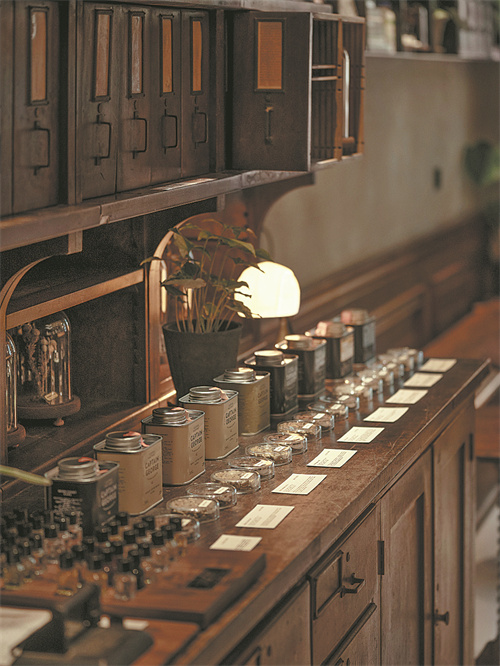
The cafe is where Peng hopes customers will slow down and truly taste coffee's nuances. [Photo provided to China Daily]
All rights Reserved. 京ICP备13028878号-8







 Overview
Overview Guiyang
Guiyang Guian New Area
Guian New Area Liupanshui
Liupanshui Anshun
Anshun Qianxinan
Qianxinan Qiandongnan
Qiandongnan Qiannan
Qiannan Zunyi
Zunyi Tongren
Tongren Bijie
Bijie Guizhou commits to culture preservation and rural vitalization
Guizhou commits to culture preservation and rural vitalization Guizhou voice at 2025 national two sessions
Guizhou voice at 2025 national two sessions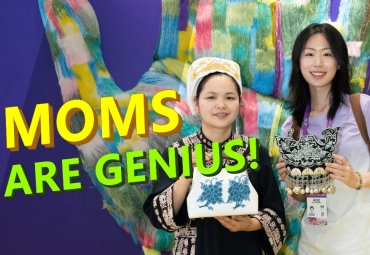 Meet the 'genius moms' at Shenzhen cultural fair
Meet the 'genius moms' at Shenzhen cultural fair 
